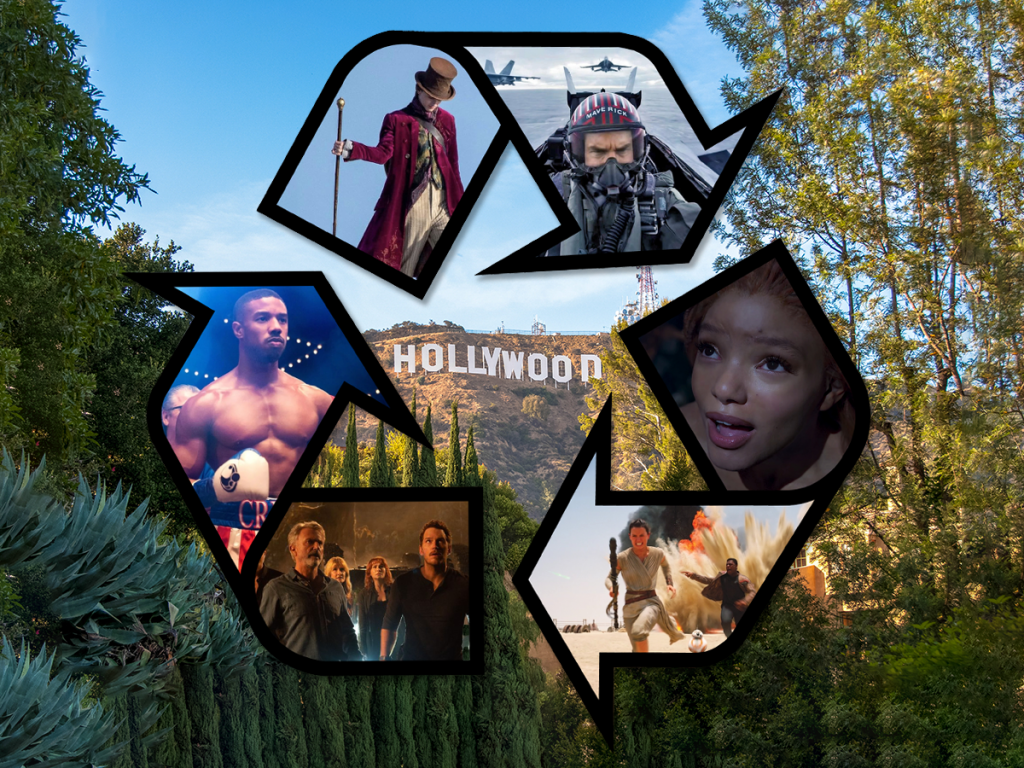Label volunteer, Connor Forbes, dives into the controversial topic surrounding film remakes and reboots. Are they simply a cop out, or have they forged some of the greatest films of the decade?
Have you been keeping track of your recycling recently? Well fear not, because Hollywood’s got you sorted. In a recent podcast, Quentin Tarantino made controversial claims that we are living in the worst era of moviemaking.
Outrage, as it often does, sparked on social media against the critically acclaimed director.
But is he inaccurate in this bold claim? More than ever Hollywood grips onto its franchises, whether through sequels or reboots; the latter of which I aim to focus on. Because why roll the dice on a new idea when you can make 12 Star Wars movies?
Traditional remakes as we know them are far from a new concept, in fact critically acclaimed films such as Scarface, The Thing, and even A Star Is Born are all retellings of old ideas. There have been remakes that have surpassed their predecessors including 2012’s Dredd which in my opinion is one of the most underrated pictures to exist.
But for present day the term “reboot” holds a negative undertone as a result of the excessive mediocrity tied with it. However, this does not by any means refer to their commercial success, and the Disney live-action remakes are a testament to that. These have been a great success with the Lion King remake from 2019 earning an astounding $1.6 billion and ranking the 8th highest grossing film of all time. But what are the fundamental implications? Disney’s understanding that they can take a story already released, slap on a new coat of paint, and reap the rewards diminishes originality in the industry.
The other side of reboots and remakes that have also seen great success are the “soft reboots” which disguise themselves as sequels to beloved franchises. Certain soft reboots such as Star Wars the Force Awakens and Jurassic World saw criticism that they failed to push the grand story forward, instead being a re-tread of the original with cameos from legacy characters.
I find that soft reboots such as these lack the passion or creativity of the movies they share their titles, instead they are simply products of an industry.
Despite this, one soft reboot which is a personal favourite of mine is Tron Legacy. Released almost 30 years after the original, Legacy tells a bold story of loss and the endless chase of perfection whilst aptly staying true to the first film.
Whilst it performed mildly well at the box office, it paved the way for the industry’s push to continue old properties.
Another that achieved the same quality whilst still respecting what came before was Top Gun Maverick. These two proved that it is possible for quality content to be made from previously established titles, though the majority of what we have seen has been lacklustre and prove Tarantino’s argument.
Looking to the future we have more reboots on the horizon with The Little Mermaid starring Halle Bailey, Wonka with Timothée Chalamet and a third movie in the Creed franchise, which is itself a soft reboot of Rocky. Hollywood will keep returning to what has earned the most.
So is Tarantino correct, is the movie-business at its worst in terms of quality? It’s difficult to say for sure. What is familiar is more profitable; the reason why there have been two separate attempts to bring back Ghostbusters in 5 years is because the story is already done before pre-production starts.
Money is louder than any product; the previously mentioned Dredd did poorly in the box office and, despite rave reviews and a cult following, a sequel has never seen the light of the screen. Whilst it is true that when looking at IMDB’s release calendar you will see a lot what has been done before, originality can still be found. For example, the recent dark comedy by Martin McDonagh, The Banshees of Inisherin, is a spectacular story of friendship that is lifted by its setting and atmosphere.
I also cannot recommend enough Everything Everywhere All at Once starring Michelle Yeoh, which takes every chance to be different from traditional Hollywood.
Edited By: Rachel Cannings (Culture and Entertainment Editor)
Design By: Connor Forbes
Design Edited By: Sarim Mangi (Head of Design)


